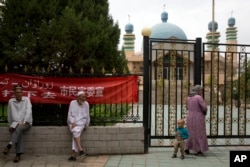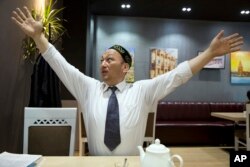China says it is saving Muslim ethnic minorities from religious extremism by teaching them to speak Mandarin Chinese and accept modern science.
A senior Chinese official made that argument in a report Tuesday. The report marks China’s latest effort to defend its mass detention of ethnic Uighurs, Kazakhs and others in reeducation camps.
The official Xinhua News Agency published the report. It said the ruling Communist Party’s plan includes teaching ethnic minorities Chinese culture, language and history. It said such efforts would help prevent extremism and teach them a “modern” way of life.
A United Nations group and human rights experts have estimated that around 1 million Uighurs and other Muslims have been detained in extrajudicial camps in western China’s Xinjiang region.
About 11 million Uighurs live in Xinjiang. They have long faced restrictions on their religious activities, cultural traditions and the use of their language. They also say they face widespread job discrimination in Xinjiang.
In the Xinhua report, Xinjiang leader Shohrat Zakir described the camps as a network of “free vocational training” centers. He said people there learn skills that will help them find work in manufacturing or in food and service industries. He said they earn some money during the training and receive free food and rooms.
Some former camp detainees have described the conditions inside the camps to Associated Press reporters and human rights organizations. They have explained the reasons for why they were detained. The reasons include praying, looking at a foreign website, teaching in the Uighur language and communicating with people – including family members – who live outside of China.
In Tuesday’s report, Zakir said the vocational training centers were for those “suspected of minor criminal offenses” who do not need “criminal punishment.” He also said the “trainees” had been living in poverty before and were open to the influence of terrorists. He suggested the measures were within China’s anti-terrorism laws.
Maya Wang is a senior China researcher at Human Rights Watch. She said the camp system refused detainees basic protections in the criminal justice system, including the right to see a lawyer.
Omir Bekali is a Kazakh citizen who was born in Xinjiang. He was detained in a reeducation camp. He told AP reporters that he and others in the heavily guarded camp were forced to reject their Islamic beliefs, criticize themselves and loved ones and give thanks to the Communist Party.
If Bekali refused to follow orders, he said he was forced to stand in front of a wall for five hours at a time. At times he was not given food for 24 hours.
He said he was kept in a locked room with eight other detainees. They shared beds and an unclean toilet. A camera was put on the toilet. Bathing, he said, was rare.
In a Human Rights Report last month, other former detainees described similar treatment and poor living conditions inside the camps.
Zakir appeared to try to deny such conditions, telling Xinhua that “trainees” took part in physical exercise and cultural activities. The eating areas provided them healthy, free food. And, he said, the rooms at the center had televisions, air conditioning and bathing areas.
Zakir added that the teachings they received would put the trainees on a path toward a “modern life” and help them feel, in his words, “confident about the future.”
I’m Ashley Thomson.
The Associated Press reported this story. Susan Shand adapted this story for Learning English. Ashley Thompson was the editor.
_______________________________________________________________
Words in This Story
extrajudicial – adj. to be held without a trial
vocational – adj. relating to the special skills, training, etc
backward – adj. not as advanced as others in learning or development
confident – adj. to be certain of oneself
region – n. an area of a country or continent
liberate - v. to set free
bathe - v. to immerse oneself in water to cleanse











